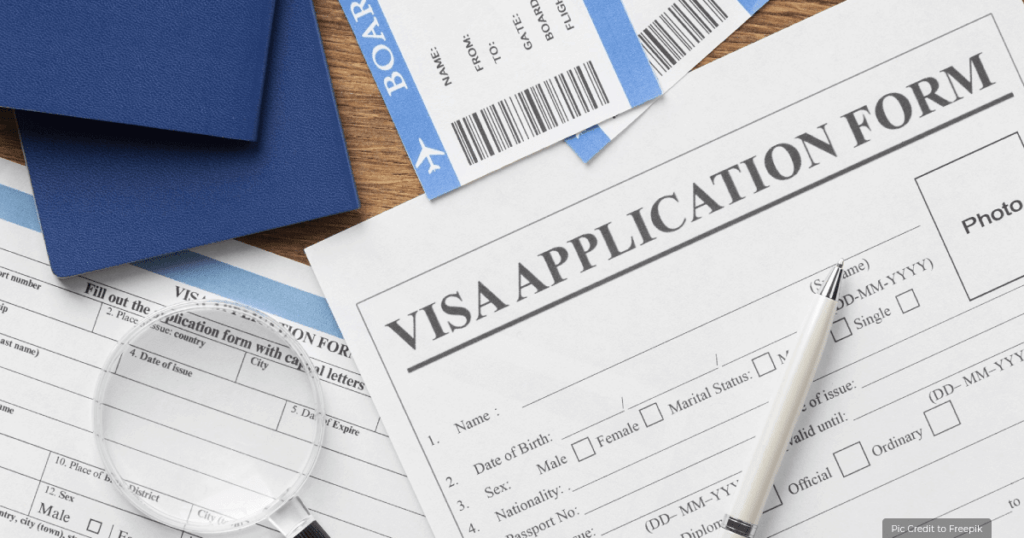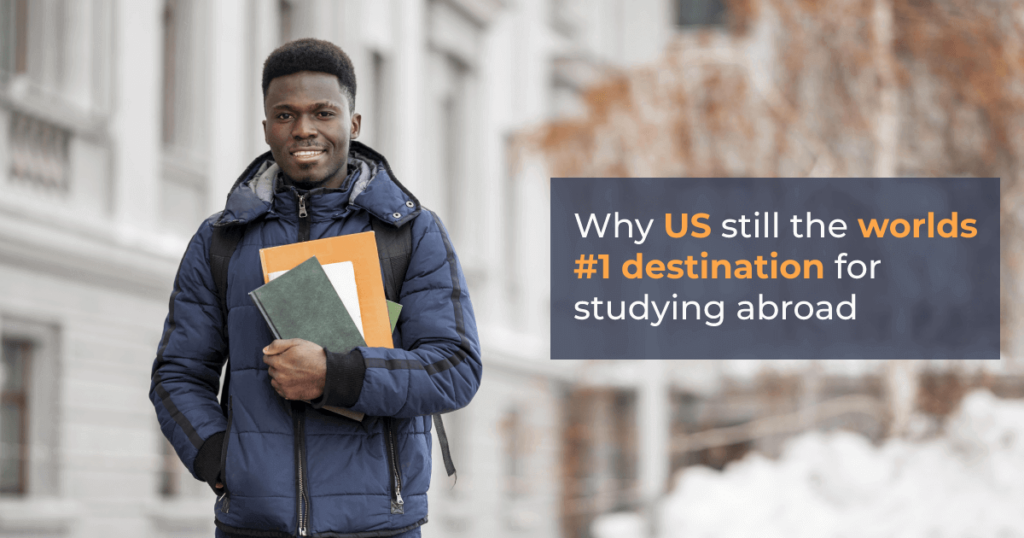Common Reasons for Visa Rejection and Visa Refusal – Travelling is fun and involves visiting new countries and exploring local food and culture. But all that fun comes after some effort, like planning an itinerary, booking your accommodation, planning your travel, and, most importantly, getting your visa.
A visa is a legal document the host country grants officially permitting you to enter that country. Getting a tourist visa is easier than a student visa because a student stays in the country for many years, while a tourist might stay there for a few days. However, knowing the reasons for visa rejection can help you save a lot of time.

Visa denial and Visa refusal are two commonly interchanged terms during the Visa process.
Visa refusal happens when your Visa application is valid but fails to convince the case worker that what you state in your application is true. This will impact your future visa applications and travel history.
This happens if you miss a crucial document in your application like:
- Incomplete financial evidence and documents
- The source of funds that you provided is not acceptable
- Any kind of misrepresentation of identity, purpose or funds
Visa Denial or rejection happens when your application itself is not valid. This is due to minor mistakes in your application where you fail to meet the validity requirements like:
- Missing out on filling a mandatory section
- Not paying the correct fees
- Your passport is valid for at least the next six months
- Such other conditions as stated by the host country’s visa requirements.
It is advised to seek professional help if you are applying for a student visa for the first time since all the documents need to be provided with supporting documents.
You cannot risk your application looking like a misrepresentation. Contact SecureMyScholarship for end-to-end guidance and assistantship.
Let’s dive in!
Here, we have given the top 10 Reasons for visa rejection or refusal
1. Incomplete application
A visa application must be filled with all the mandatory information. Any mandatory blanks left unfilled or missing data can lead to Visa rejection. Check all the details and ensure the application is error-free before submitting the application. Provide all the necessary supporting documents.
If you are stuck at any point in filling out the application, read the instructions next to the blank carefully. If you still need help figuring it out, contact your visa counsellor. You can consider this to be one of the common reasons for visa rejection. Know all the documents required for Student Visa.
2. Insufficient travel details
One more reason for visa rejection is insufficient travel details. The Visa officials will deep dive to know the exact reason for your travel since they want people to refrain from trespassing into their country.
You need to have enough travel and health insurance coverage to cover any contingencies that might occur. Each country prescribes minimum insurance coverage based on your purpose of travel. You must provide your flight and hotel booking details if you are a tourist, and you must provide your admission offer letter if you are moving on a student visa.
Most visas get rejected due to incomplete travel details. Hence, provide complete travel details like travel date and duration, the list of countries in your itinerary, and your hotel and flight booking details to support it. Disclose all the necessary details and have insurance coverage to avoid visa rejection.
3. Insufficient funds
Every country has a prescribed amount of money to be maintained in your bank account when you plan to travel abroad. This is to ensure that you are financially stable and can bear the expenses of your travel, food and accommodation when visiting that country.
For example, you must have at least $5,000 to $10,000 in your account when travelling to the US for around 15 days. If you don’t show the minimum prescribed funds in your account, your visa’s chances of rejection are high. Also, note that your source of that fund must be legal. Trying to show fake statements and fake sources of funds will become one of the reasons for visa rejection. Know the minimum account balance for US Student Visa.
4. Crime History
Crime history is one of the major reasons for visa rejection and visa refusal. Irrespective of the scale of crime, you should have a clean criminal record because the visa officers will thoroughly check your background before granting you a visa. If they find a criminal record during the verification, your visa will most probably be rejected based on the country’s policies. Some countries grant visas based on the nature and severity of the crime committed. In contrast, some countries have a stringent rule that does not provide visas to people with criminal histories as they pose a threat to the nation’s security.
5. Return to home country
No country wants a foreigner to overstay or settle in the country without a proper reason or adding value to the country, using the resources meant for domestic people. It is imperative to show your ties with the home country and that you intend to return home once your purpose of travel is served. This is not a significant problem when you apply for a tourist visa, as the duration is short, and you will also provide the booking details of your return flights.
However, this is one of the common reasons for visa rejection. You must provide enough evidence for your claim of returning home. You can eventually extend your visa or convert the visa into a work visa or permanent residence if you want after staying in the country for a few years. Still, when applying for a student visa, you should convince the visa officer that you are planning to return as the duration of the visa ends.
6. Health issues
Different countries have different guidelines for medical screening during the visa process. This screening is given more significance after the global pandemic in 2019-2020.
You must test negative for COVID-19, must be promptly vaccinated and should have the vaccination certificate. Some countries require other medical tests for people who wish to stay longer. For instance, you must take a tuberculosis test to get a UK visa for over six months. This is done to avoid any risk to public health from a traveller carrying new or dangerous diseases. Keep your vaccination certificates updated with your Adhaar, take timely tests, and stay healthy. Otherwise, it will result in visa rejection and hamper your travel plans.
7. Interview issues
Some countries have a short face-to-face interview as a part of the visa process. Communicate clearly and calmly with the interviewer. Speak confidently, and make sure you align all your answers with the details mentioned on your application regarding your travel date, purpose of visit, etc.
Student visa applicants to the UK and US are among India’s most common visa applicants. It is advisable to be transparent and answer with facts. Trying to hide information for yourself and your purpose will make you look shady.
Prepare well before appearing for the visa interview because if the visa interviewer is unsatisfied with your answers and doesn’t find you genuine, there is a high chance of your visa getting rejected. Do you know what questions are asked in Visa Interviews? No, then check here.
8. Unclear purpose of travel
This is the most crucial aspect of the entire visa application process. Hence, state the purpose of your travel clearly with supporting documentary evidence.
If you are travelling as a tourist, you have to give your entire travel plan and itinerary because if you have to catch connecting flights in a different country, you will need a visa for that as well. You must provide details about the date and duration of travel, flight and hotel bookings, etc. If you are moving abroad to study, you must provide evidence, like your admission letter, to support that claim. If the visa officer gets skceptical about the purpose of your travel, your visa might get rejected. Hence, provide all the necessary details to avoid any ambiguity.
9. Overstaying a previous visa
Your travel history is the proof of your credibility. People who have travelled to many countries in the past without breaching any rules have a higher chance of getting their next visa granted easily. This will not be an issue for first-time travellers, but if you have already travelled to other countries, you must have a clear travel history. You should not have any overstaying issues, trespassing or offences recorded during travel.
The visa officers will do a thorough background check before granting you a visa, and they can easily track your record history. The last thing they want you to do is to overstay and get involved in illegal activities. If you have done it in the past, you are more likely to do it again, so your visa will be rejected.
10. Delay in application
Travelling abroad cannot be planned on short notice, especially when you are moving abroad to study. The entire process, from deciding to study abroad to actually moving abroad, involves a lot of work that needs to be done within the deadlines. Submitting university applications has a deadline; once the conditional offer is released, you have a deadline to fulfil all the mentioned conditions.
Similarly, there is a time frame within which you must apply for your visa. There are several types of visas to be chosen from based on your purpose. Apply for the correct type of visa at least 45 days prior to your travel date. Having less than 30 days for the travel date since the visa application date can lead to your visa rejection.
There are numerous reasons why your visa application can be rejected or refused. A visa is a crucial document for travelling to most countries (some countries allow travellers from specific countries without visas); hence, ensure you get it all right in time to avoid messing up your travel plans.
Do you want to get your Visa?
At Securemyscholarship, we can help you out in applying for a visa, and we can guide you throughout the process so that you do not get any of the reasons for visa rejection. We focus on making education accessible and affordable to everyone. Read the instructions carefully if you get stuck while filling out your visa application. If you are a student looking to study abroad and finding each step daunting, our expert counsellors are just a click away.
FAQ
1. How do I know the reason for visa rejection?
You can ask the Visa officer or check it on the host country’s official consulate website.
2. Is visa rejection stamped on the passport?
It differs from country to country. Most countries place a stamp on the passport; if your visa has been rejected, the next officer who checks your issues with your future travel permits will be able to see your history of rejection.
3. Can I re-apply for my visa?
Based on the type of visa, you can re-apply after a certain period; however, if you feel that the reason for rejection was due to a minor misunderstanding, you can write a letter of appeal.
4. Will I get a refund if my visa is rejected?
Unfortunately, your visa application fee will not be refunded; however, your health insurance surcharge will be refunded. If you want to re-apply for a visa, you must pay the application fee again.
5. How to avoid Visa rejection
A few things you can do to avoid visa rejections are as follows
- Provide all the necessary documents
- Show proper financial sources
- Speak with confidence aligning with what you mentioned in your application at the interview.
- Start the process early.




